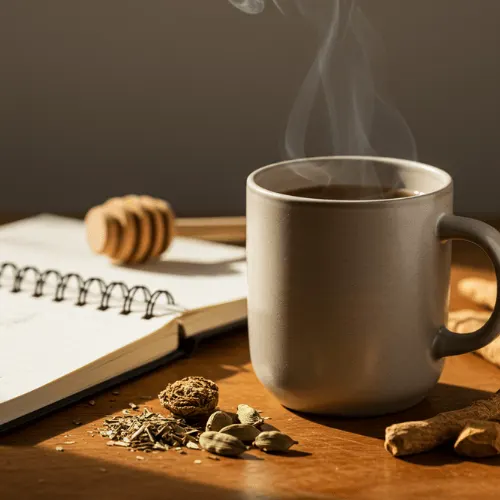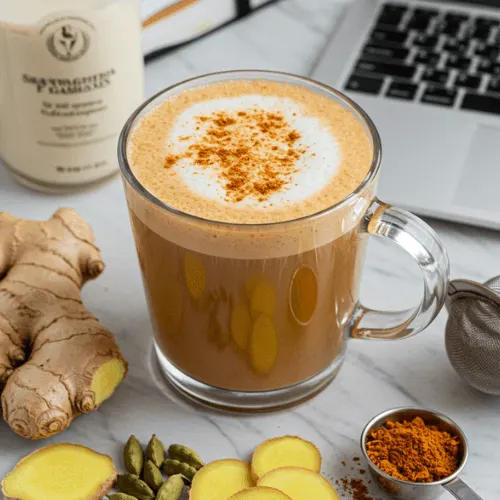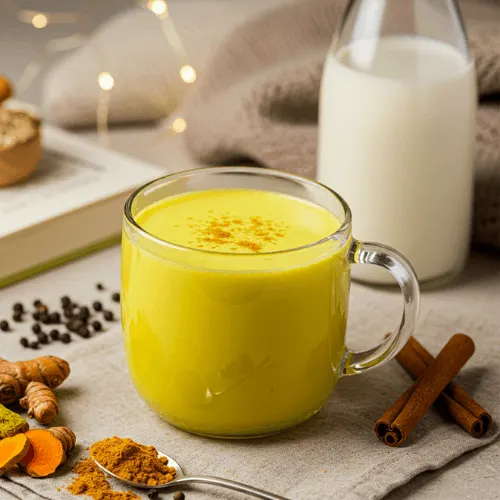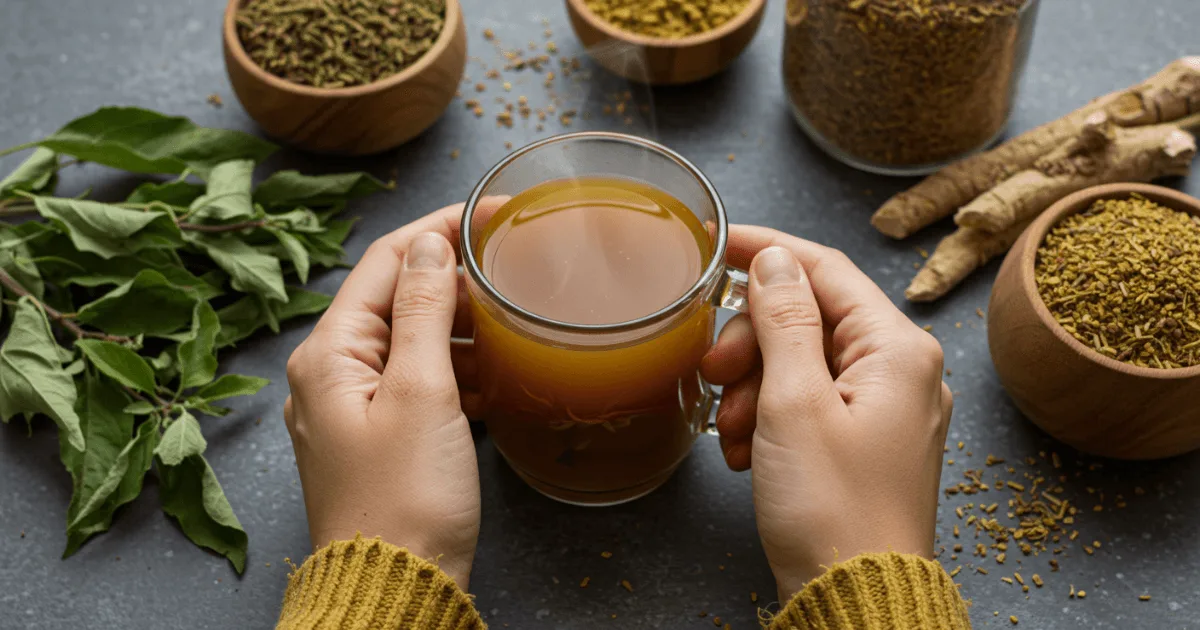You’ve been there: lying awake at 2 a.m. with your brain looping the same thoughts, relying on coffee to stay alert, feeling both hyper and fatigued by the afternoon. I get it—I’ve lived that cycle too.
That’s why I fell hard for ashwagandha tea. Not some fancy wellness fad, but real plant medicine that’s been helping humans cope for thousands of years. It’s like your nervous system’s best friend—the kind that shows up with soup when you’re sick, no questions asked.
Table of Contents
Here’s the tea (literally):
- Three simple recipes (my golden milk hack saves me from 3 a.m. anxiety spirals)
- When to drink (sip at the wrong time and you’ll miss the magic)
- Who should skip it (because even good things have fine print)
This is not about introducing an additional duty to your day. It’s about stealing back quiet moments—one comforting sip at a time. Your future calmer self says thanks. Interested in learning how to create your first brewed cup?
What Is Ashwagandha? The Science Behind the Herb
Let me tell you about my unusual plant crush—ashwagandha. This rough-looking root doesn’t win any beauty contests (seriously, it smells like a horse’s saddlebag, hence its name), but it delivers where it counts.
Our grandparents’ grandparents knew what was up. For three thousand years, Ayurvedic healers have prescribed this earthy herb not just to survive life’s storms, but to dance in the rain. Modern science is finally catching up to what grandma knew all along.
This is why it’s my preferred choice when things get hectic:
- It’s like a stress whisperer: Instead of slapping a Band-Aid on anxiety, it teaches your body to handle pressure like a yoga master handles a wobbly tree pose.
- Sleep’s best friend: Works with your brain’s natural chill-out chemicals (looking at you, GABA receptors) so you wake up refreshed, not groggy.
- Brain fog buster: Clears the mental cobwebs better than my third cup of coffee, minus the jitters.
Pills versus Tea? Sure, you could choke down another supplement, but there’s magic in the ritual—the steam curling from your mug, the quiet moment of stirring honey into that earthy brew. It’s self-care you can taste.
That funky horse smell? That’s the scent of resilience. And your nervous system is about to get very familiar with it.
A Guide to Expertly Brewing Ashwagandha Tea
Let’s be real—when life’s handing you stress, the last thing you need is a complicated tea recipe. Here’s my stripped-down, foolproof method for making ashwagandha tea that works (without turning your kitchen into an apothecary).
What You’ll Need:
- 1 teaspoon of dried ashwagandha root (or ½ teaspoon of powder if you’re in a hurry like I am)
- 1 cup water (filtered if you’re fancy)
- Select your preferred flavor boosters: a cinnamon stick, a piece of ginger, honey, or a dash of milk.
How to Make Magic Happen:
- For optimal results, go low and slow—place the ashwagandha in water and allow it to gently bubble for 10 to 15 minutes. Set a timer unless you enjoy the “burnt herbs” aroma.
- Strain it like you mean it—unless you enjoy chewing your tea, pour it through a fine mesh strainer.
- Dress it up—start with a teaspoon of honey or a cinnamon stick stirrer. Your taste buds will thank you.
Real Talk About Taste
That first sip? It’s like the earth decided to make tea—deep, grounding, and slightly bitter. To be truthful, it’s a taste that grows on you. But here’s the secret: the more you drink it, the more your body craves that earthy goodness. If it’s too much at first, think of it as coffee’s calmer cousin and add your favorite flavors.
Why This Works
Unlike tossing back a capsule, brewing it slowly lets the good stuff (those stress-busting compounds) fully extract. Plus, the 10 minutes of simmer time? That’s 10 minutes you’re not checking emails or doomscrolling. Bonus self-care points.

Three Life-Changing Ashwagandha Tea Recipes
Let’s face it—most “healthy” teas taste like dirty water. But these? These are the secret weapons in my stress-busting arsenal. I’ve perfected them through years of trial and error (and many terrible cups of tea).
1. The “Oh God, Make It Stop” Stress Relief Brew
For when your brain won’t shut up and your to-do list is laughing at you.
Why this combo rocks:
Tulsi (holy basil) is like ashwagandha’s chill best friend—together they’re the ultimate anxiety-busting duo. That pinch of cardamom? A secret digestion hack for when stress knots up your stomach.
What you’ll need:
- 1 teaspoon of ashwagandha root (powder can be used instead)
- 1 teaspoon of tulsi leaves, or choose 2 fresh leaves if preferred
- 1 cup water
- Honey to taste (I use a full teaspoon, no shame)
- Tiny pinch of cardamom (trust me)
Instructions:
- Let all the ingredients, except for the honey, simmer for 10 minutes (make sure to set a timer!).
- Strain into your favorite mug—the one that doesn’t judge your life choices.
- Stir the honey until it reaches the texture you like.
When you’re vibrating with stress but still need to function.
2. The “I Need Sleep But My Brain Has Other Plans” Nightcap
For when counting sheep turns into solving all your life problems at 3 a.m.
Why does this work magic?
Warm milk plus ashwagandha equals nature’s melatonin. Turmeric reduces inflammation resulting from stress. Black pepper makes the turmeric actually work (science!).
What you’ll need:
- ½ teaspoon ashwagandha powder
- ½ teaspoon turmeric (fresh grated if you’re extra)
- 1 cup almond milk (the vanilla kind is cheat mode)
- ¼ teaspoon cinnamon
- Tiny pinch of black pepper (seriously, just a pinch)
- 1 teaspoon maple syrup (or honey if that’s your jam)
Instructions:
- Warm milk gently—if it boils, start over.
- Mix in the rest of the ingredients with determination.
- Transfer to a mug and act like it’s a $12 latte.
Relish a sip as you read tangible paper pages (screens spoil the allure).
3. The “Coffee Makes Me Anxious But I Need to Adult” Chai
For when you need energy without the panic attack.
Why it’s brilliant:
Ashwagandha smooths out caffeine’s rough edges. Ginger keeps your stomach happy (because stress gut is real). Cardamom makes it taste expensive.
What you’ll need:
- 1 teaspoon ashwagandha root
- 1 teaspoon black tea (or 1 bag in desperation)
- ½ inch fresh ginger (smash it with a spoon first)
- 2 cardamom pods (crush them in your teeth if you’re feeling wild)
- ½ cup oat milk (for that creamy dreamy)
- Sweetener if you’re not a masochist
Instructions:
- Boil everything except milk for 5 minutes (don’t walk away!).
- Add milk and simmer 2 more minutes.
- Strain into a mug and pretend you’ve got your life together.
Use decaf after 2 p.m. unless you want to join the 3 a.m. regret club.



The Best Times to Sip Ashwagandha Tea for Maximum Benefits
Ashwagandha tea works wonders—if you time it right. Here’s your cheat sheet:
- Morning (7–9 a.m.): Tulsi Ashwagandha Bliss
For stress relief without drowsiness—perfect for chaotic mornings. - Afternoon (2–4 p.m.): Ashwagandha Chai
Sustained energy without coffee jitters—ideal for beating the 3 p.m. slump. - Night (8–10 p.m.): Golden Moon Milk
Deep sleep and relaxation help quiet a racing mind before bed.
Consistency is key! Drink daily for four to six weeks to feel the full effects.
Want to dive deeper? Check out this scientific study on ashwagandha’s benefits from the National Institutes of Health.
Who Should Skip Ashwagandha? (Let’s Talk Safety First)
I love ashwagandha, but like that one friend who gives overly honest advice, it’s not for everyone. Here’s the real talk on who might want to pass:
- Pregnant or breastfeeding people: This herb has uterine-stimulating properties—not what you want when baking a human. Better safe than sorry.
- Autoimmune warriors: If you’re dealing with Hashimoto’s, lupus, or a similar condition, ashwagandha may rev up your immune system too much.
- Medication crew: On thyroid meds, blood pressure drugs, or sedatives? Before taking Ashwagandha, discuss with your doctor since it can increase effects.
Possible side effects:
- Might make you extra sleepy (great at night, bad for morning meetings).
- Can upset empty stomachs (pair with food if you’re sensitive).
Start with half doses (½ teaspoon) to test the waters. Your body will tell you if it’s a match—mine gave me the green light after just a few days.
Ashwagandha Tea FAQs
Let’s cut through the hype. Here’s what you want to know about this earthy wonder-tea:
What’s the big deal about ashwagandha?
Imagine an herb that:
- Turns down your stress volume (goodbye, 3 a.m. anxiety spirals)
- Gives you deeper sleep without grogginess
- Helps you focus like you’ve had the perfect amount of coffee
- Balances hormones gently (PCOS warriors, take note)
Why drink it as tea instead of pills?
Because:
- The brewing ritual is the therapy
- Your body absorbs it more slowly, resulting in smoother effects
- You can customize flavors (unlike swallowing capsules)
Who should avoid it?
- Pregnant people (it’s a uterine stimulant)
- Autoimmune conditions (can over-activate immunity)
- Anyone on thyroid or blood pressure meds (unless your doctor approves)
What’s the plant’s superpower?
It’s nature’s best adaptogen—helps your body respond to stress instead of just surviving it. Consider it as a support system for your nervous system.
Finding Serenity in a World of Chaos
We’re all running on fumes. But what if your secret weapon wasn’t another coffee, but a humble cup of ashwagandha tea? This earthy brew is like a warm hug for your nervous system, offering:
- Morning peace with Tulsi’s gentle calm
- Deep restoration in a golden moon milk ritual
- Steady energy without the caffeine crash
The magic isn’t just in the herbs—it’s in the pause. Those few minutes of steeping, sipping, and just being become a sanctuary in your day.
The initial taste may catch you off guard (indeed, it’s earthy!), But keep at it. Like all good things, the benefits grow over time—better sleep, quieter stress, more resilience.
Tonight, try this: Brew. Breathe. Believe that rest isn’t lazy—it’s necessary.
Which cup calls to you? The one for calm mornings, deep sleep, or balanced energy? Your tea—and your peace—are waiting.
P.S. The best part? It’s the medicine you want to take.


I’ve been looking for natural ways to deal with stress, and these recipes sound perfect. I’ve heard that Ashwagandha can have a very strong, earthy taste—which of these three recipes do you think is best for masking that flavor for a beginner?
You’re absolutely right, Ashwagandha definitely has a distinct ‘earthy’ profile! If you’re just starting out, I highly recommend the Honey and Cinnamon version. The warmth of the cinnamon and the sweetness of the honey do an amazing job of balancing the bitterness, making it a much smoother and more enjoyable sip!